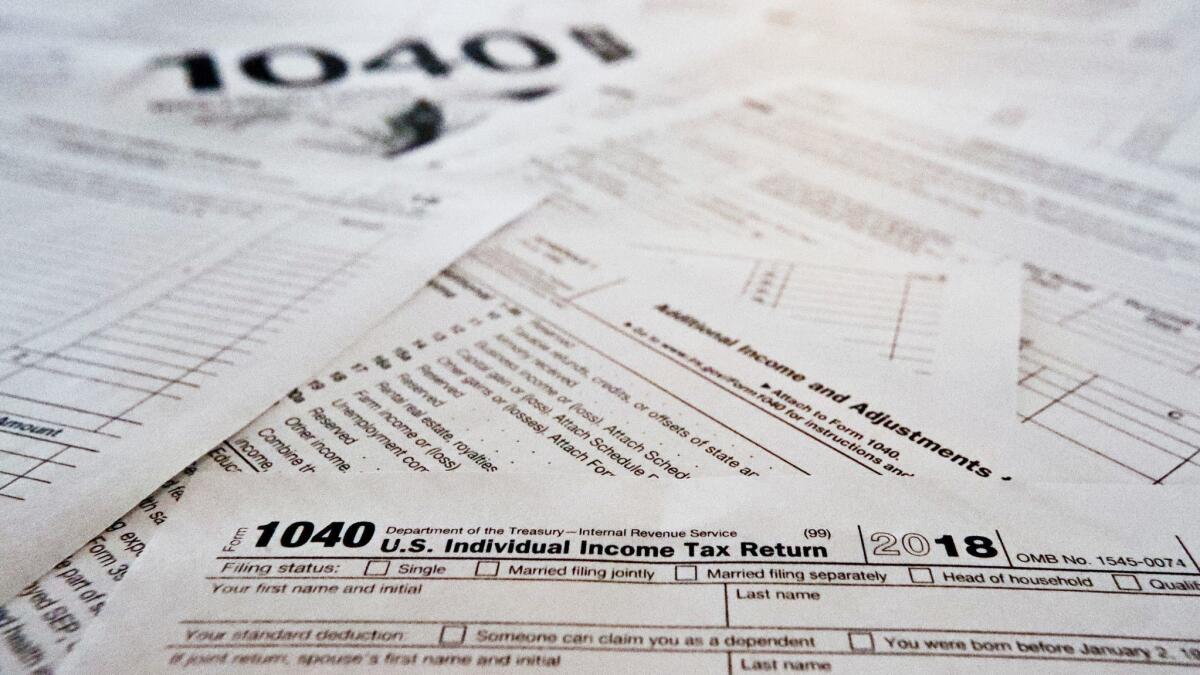Op-Ed: To take the pain out of filing your taxes, remember the payoff

Households finishing their tax forms may well be grumpy about the tax burden they bear, but they should keep their eyes on the prize: Taxes finance popular public programs such as Medicare, Social Security, education and defense. When policymakers and the public think about taxes and spending together, it generates different, and more responsible, reactions than when they think about them separately. Doing more to underline the taxes-spending connection would benefit today’s citizens and future generations.
Policymakers excel at separating taxes from spending, as a way to hide the costs of their proposals. When President Trump said he was giving us a “giant tax cut for Christmas,” for example, he neglected to mention that he would also be sending us the bill — in the form of higher future taxes or lower future spending. Likewise, the No New Taxes pledge, popularized by anti-tax crusader Grover Norquist and endorsed by most Republican politicians, does not explain that it ultimately requires no increases in spending, which would not be popular. And it’s not just conservatives trying to obfuscate cause and effect. Staunch liberal advocates of the Green New Deal tout the benefits of new spending and investment in the proposal without offering a realistic way to cover the costs.
The public usually follows the policymakers’ lead. In a 2017 Pew Research Center poll on federal budget preferences, most respondents wanted to increase or maintain funding in every major spending category. Only 20% wanted to cut defense; less than 10% would cut Medicare or Social Security. Even among Republicans, who are generally more willing than Democrats to cut spending, more respondents supported increases than cuts for Social Security, Medicare, education, infrastructure, research, defense, veterans programs and homeland security. The most popular budget cut, supported by only about a third of respondents, was foreign aid, which amounts to just 1% of all federal spending.
Policymakers excel at separating taxes from spending, as a way to hide the costs of their proposals.
But the answers change if taxes and spending are framed as a linked choice. For example, a majority (57%) of respondents in a recent CBS poll said they would not want an income tax cut if it meant the deficit would grow. Likewise, in another Pew poll about ways to address the long-term fiscal shortfall facing the United States, respondents generally favored a combination of tax increases and spending cuts.
A recent example in Kansas shows the dangers of addressing taxes and spending separately. In 2012, the Republican-led state government slashed taxes on individual income and “pass-through” businesses (where business income is reported on the owners’ individual tax forms) without reducing spending. According to research from the Center on Budget and Policy Priorities, Kansas’ economy subsequently lagged behind those of neighboring states, and the tax cut drove a hole in the budget. Lawmakers were forced to make significant cuts in vital programs such as Medicaid, education, welfare, court funding and infrastructure. When surveyed in 2017 about their preferred method to close the state’s budget shortfall, 59% of Kansans indicated that either tax increases or a combination of tax increases and spending cuts (rather than spending cuts alone) would be best.
Enter the Fray: First takes on the news of the minute »
In short, voters supported the tax cuts in isolation, but when faced with the choice between lower taxes and lower spending, or higher taxes and higher spending, they favored the latter. Later that year, with mounting public and legal pressures arising from slow growth, two downgrades of Kansas’ bond ratings and an enormous budget shortfall, the Republican-led legislature reversed much of the original tax cut and restored some spending.
The lesson is clear: Taxes and spending go together. We raise taxes to finance spending. If we want more of the latter, we need to accept more of the former.
The need to think about taxes and spending jointly is not an argument for mandating a balanced budget. Debt financing is appropriate in certain times for certain purposes. But ultimately, either we pay for our current spending or future generations do. Taxpayers should keep this in mind as they file their returns, and policymakers should make this connection every time they vote.
Economist William Gale is a senior fellow at the Brookings Institution and co-director of the Urban-Brookings Tax Policy Center. He is the author of “Fiscal Therapy: Curing America’s Debt Addiction and Investing in the Future.”
Follow the Opinion section on Twitter @latimesopinionand Facebook
More to Read
A cure for the common opinion
Get thought-provoking perspectives with our weekly newsletter.
You may occasionally receive promotional content from the Los Angeles Times.










